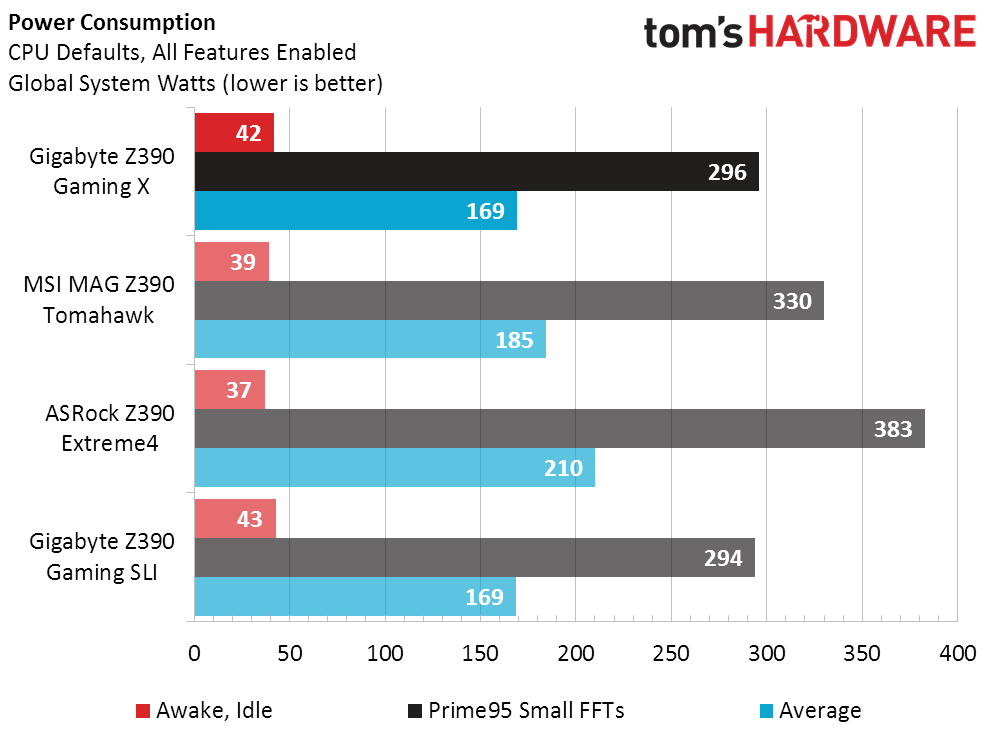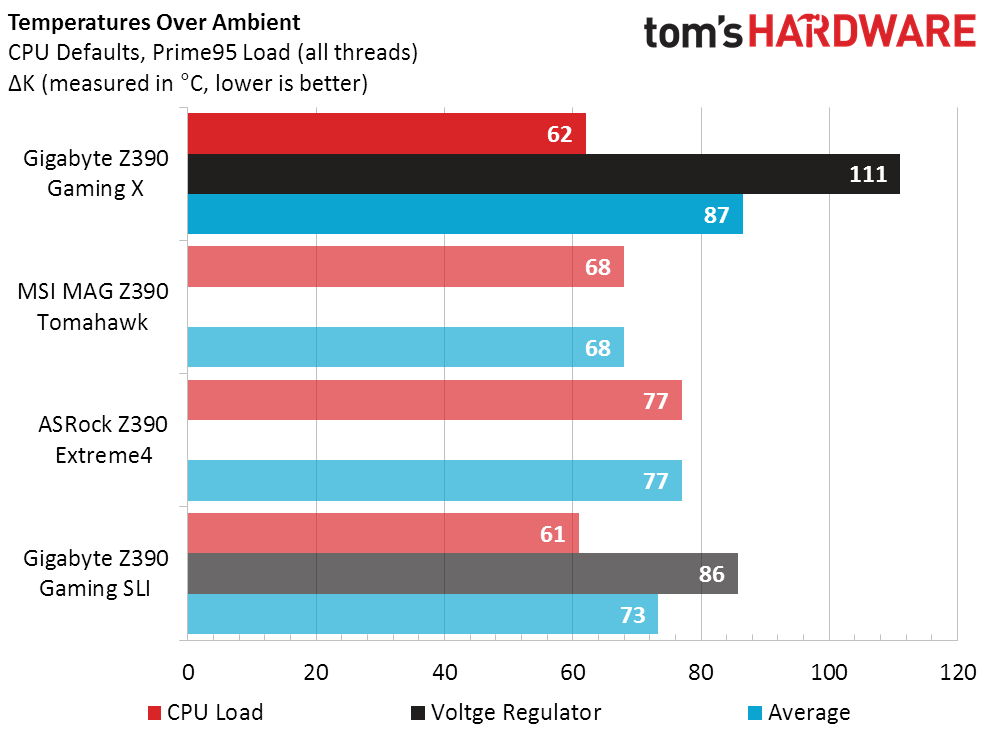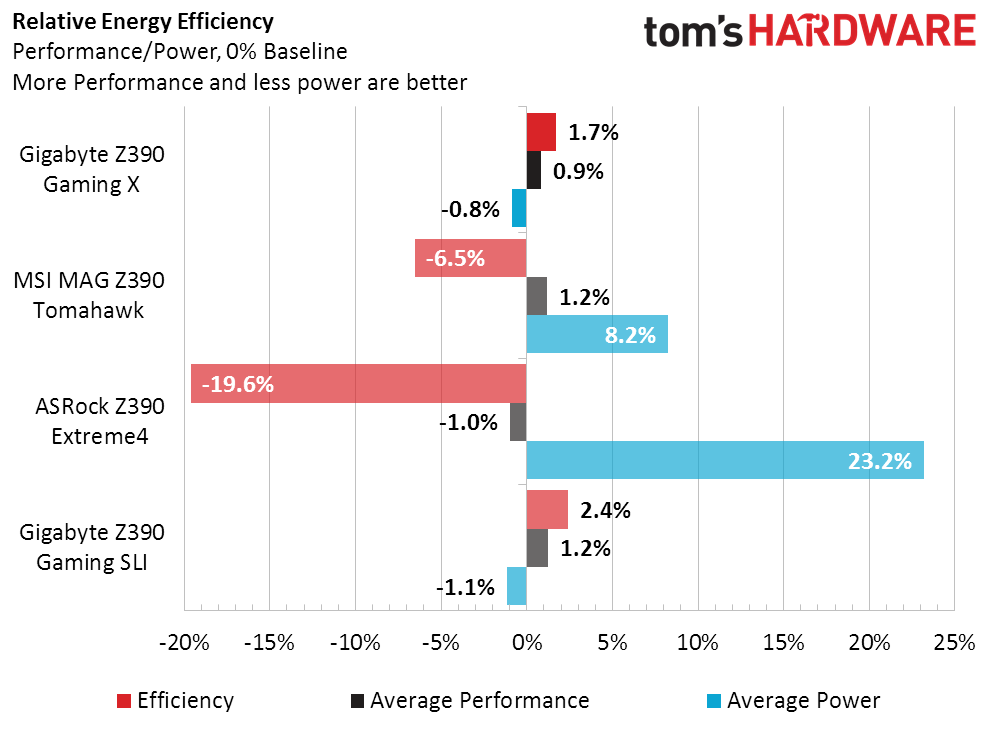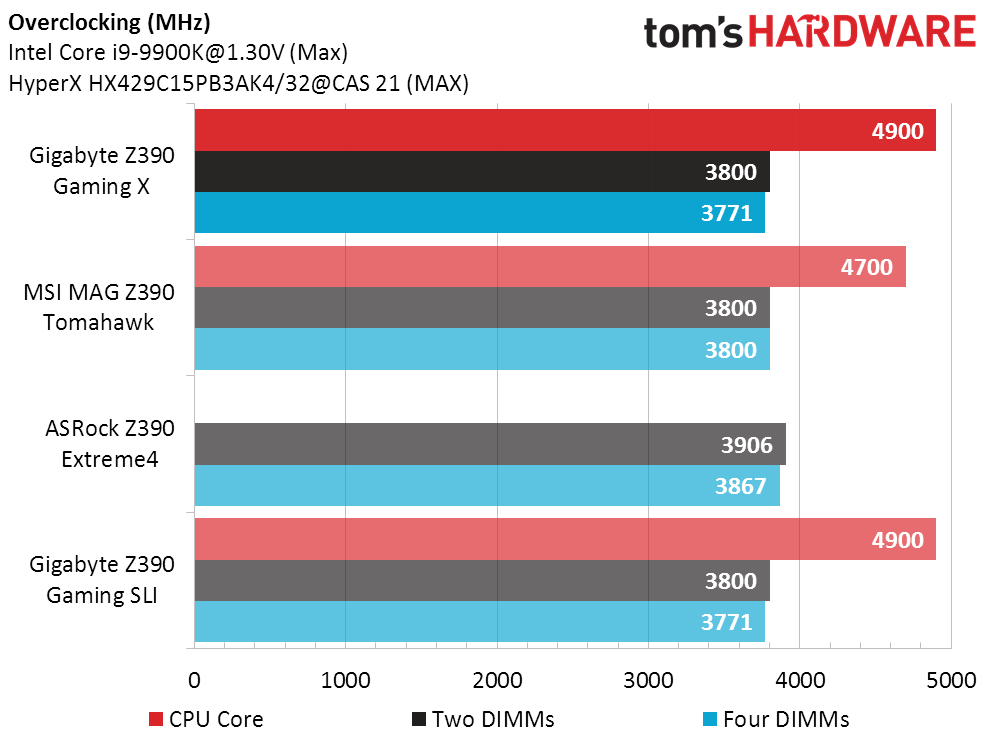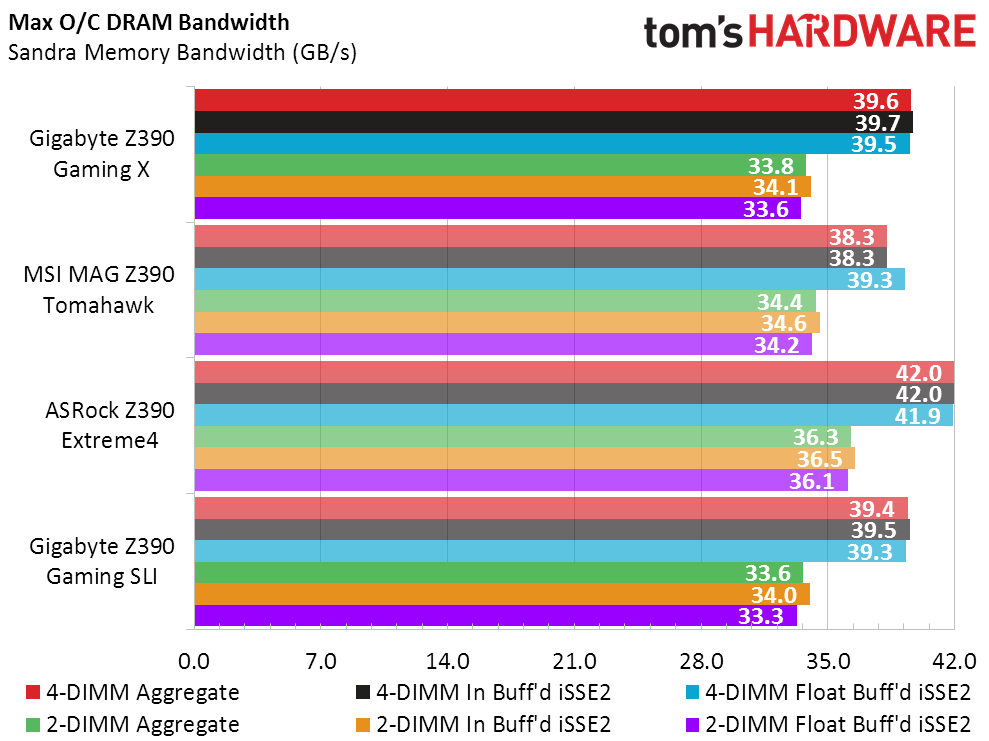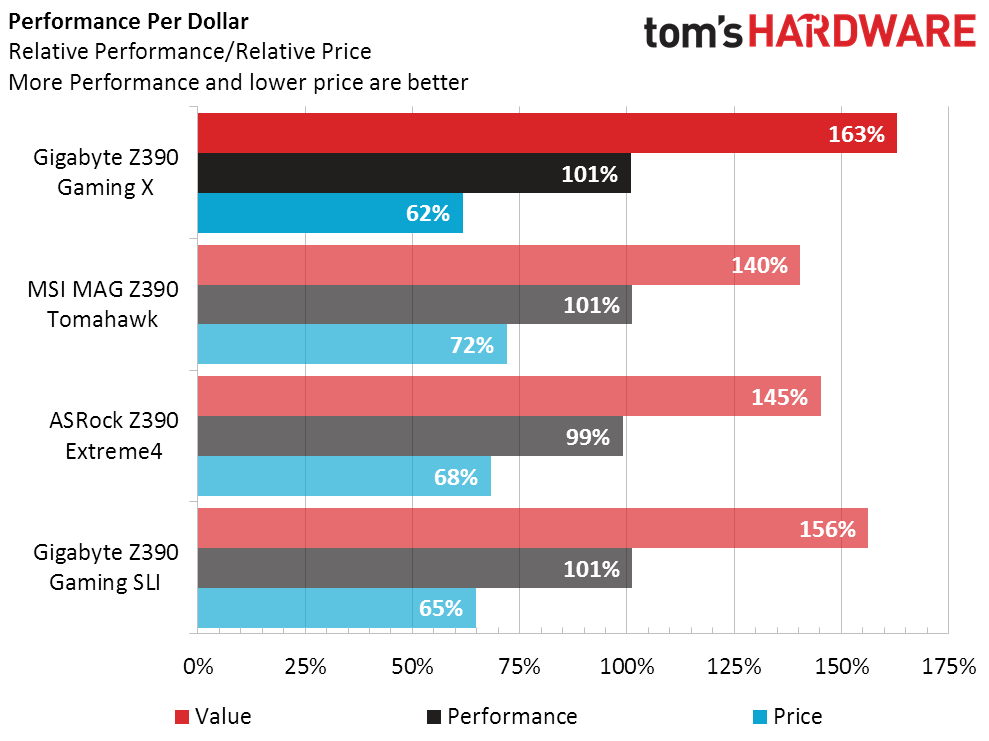Gigabyte Z390 Gaming X Review: Budget Board Bliss?
Why you can trust Tom's Hardware
Benchmark Results and Final Thoughts
Since we started this review before our new test suite was finalized, today’s review brings back all the classic charts of previous Z390 reviews. We’re also testing the motherboard’s stock performance and power levels in the classic way, with the memory at SPD defaults and the CPU’s power-saving features enabled.
Synthetic Benchmarks
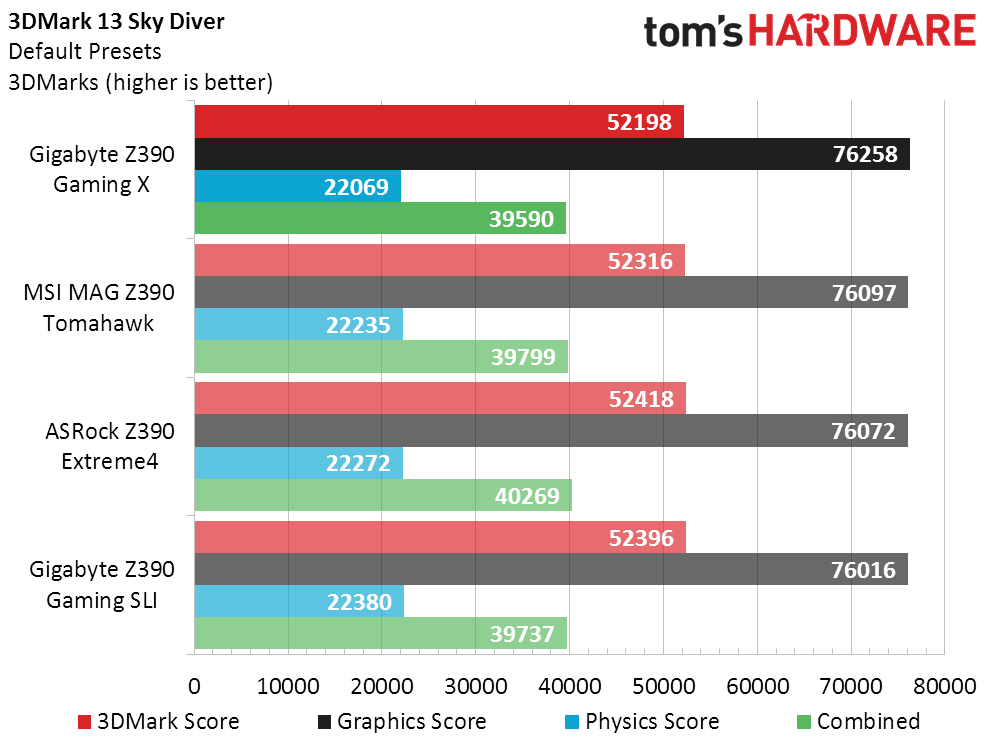
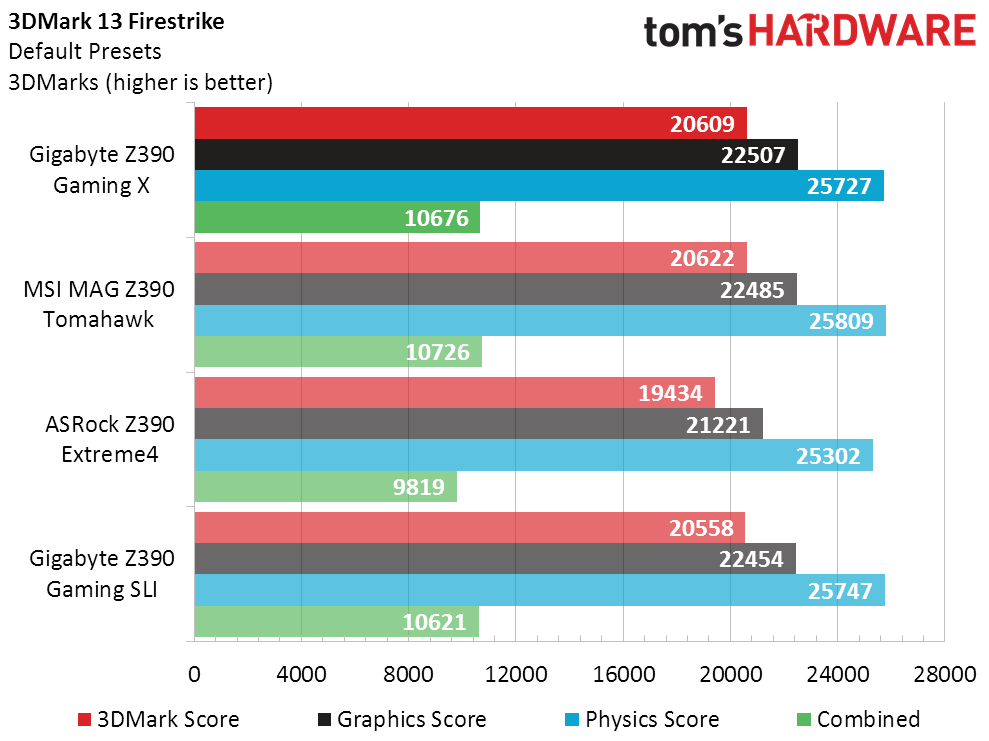
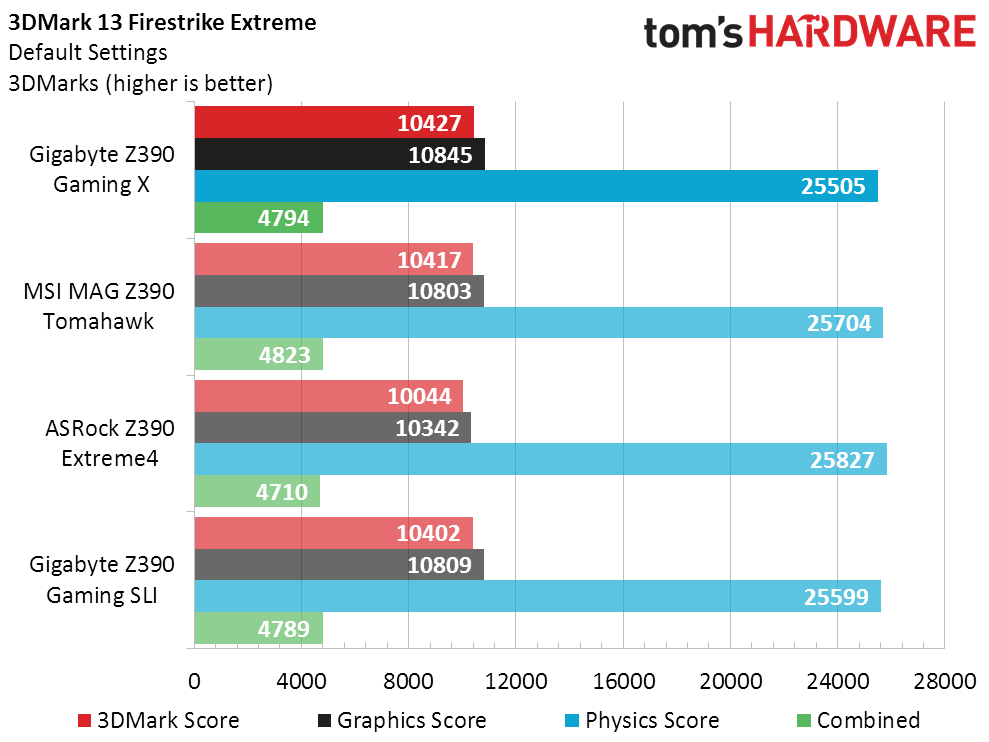
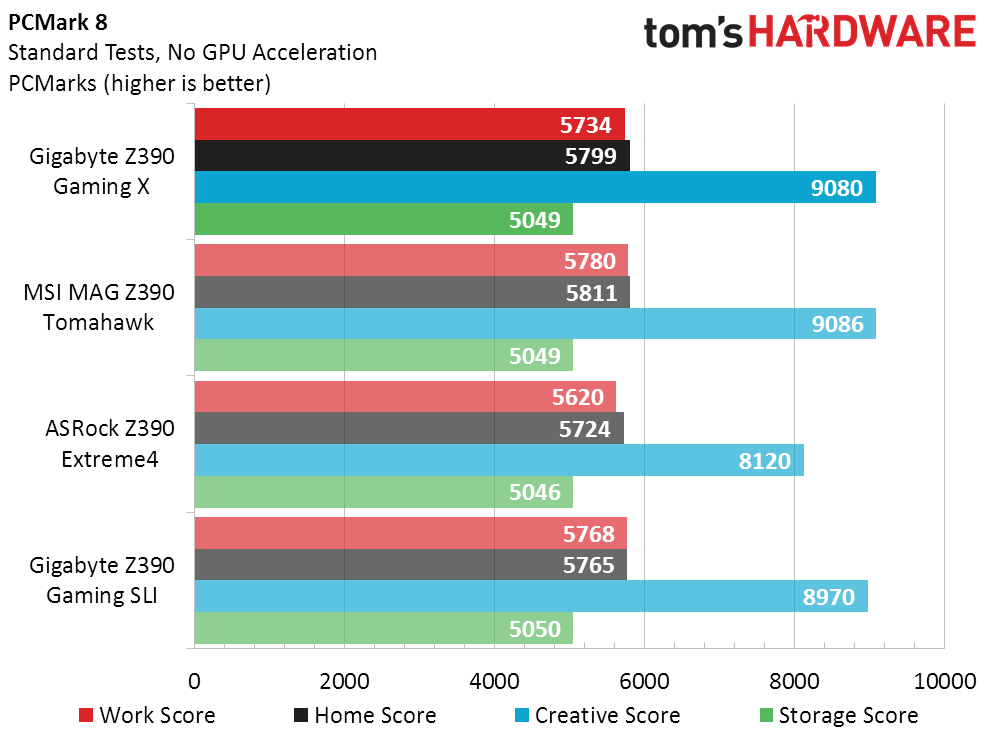
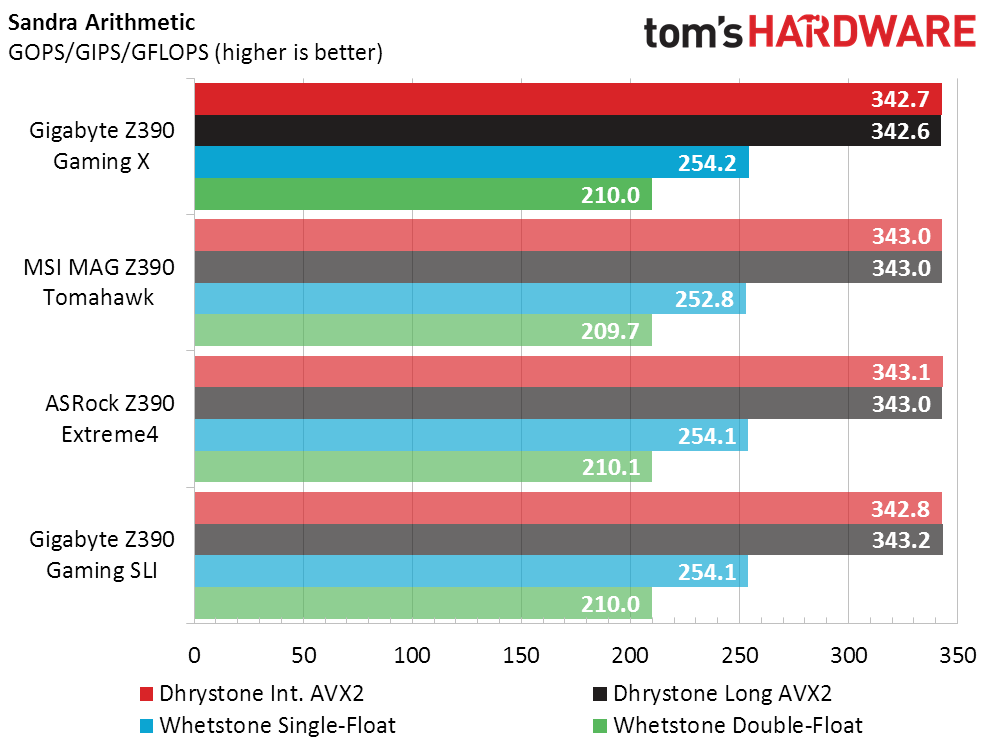
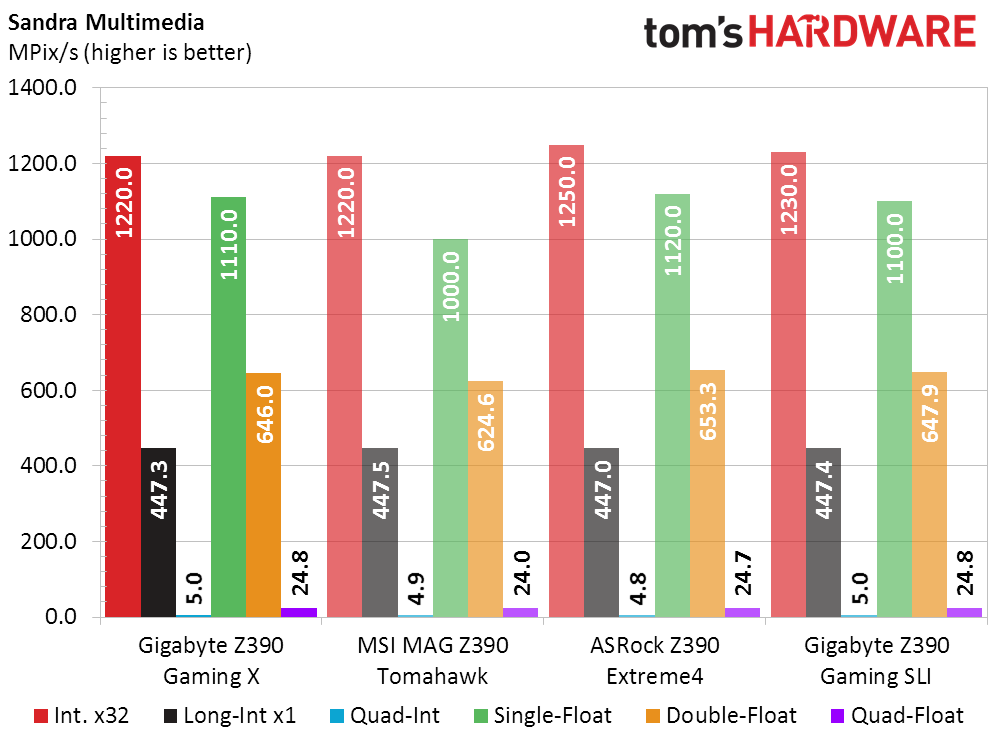
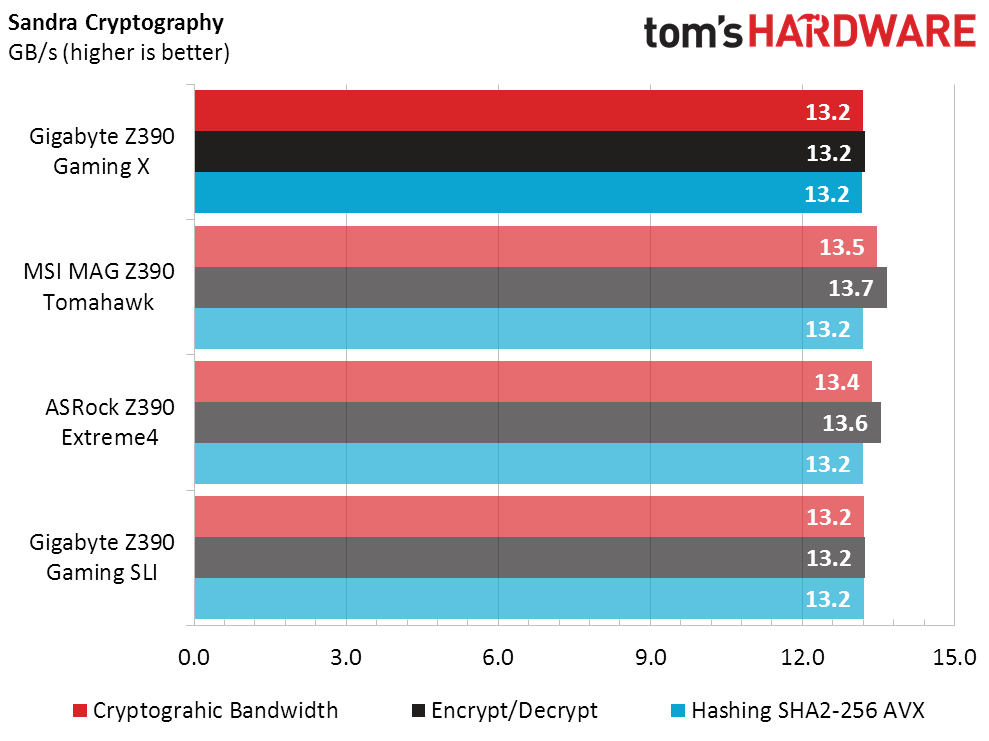
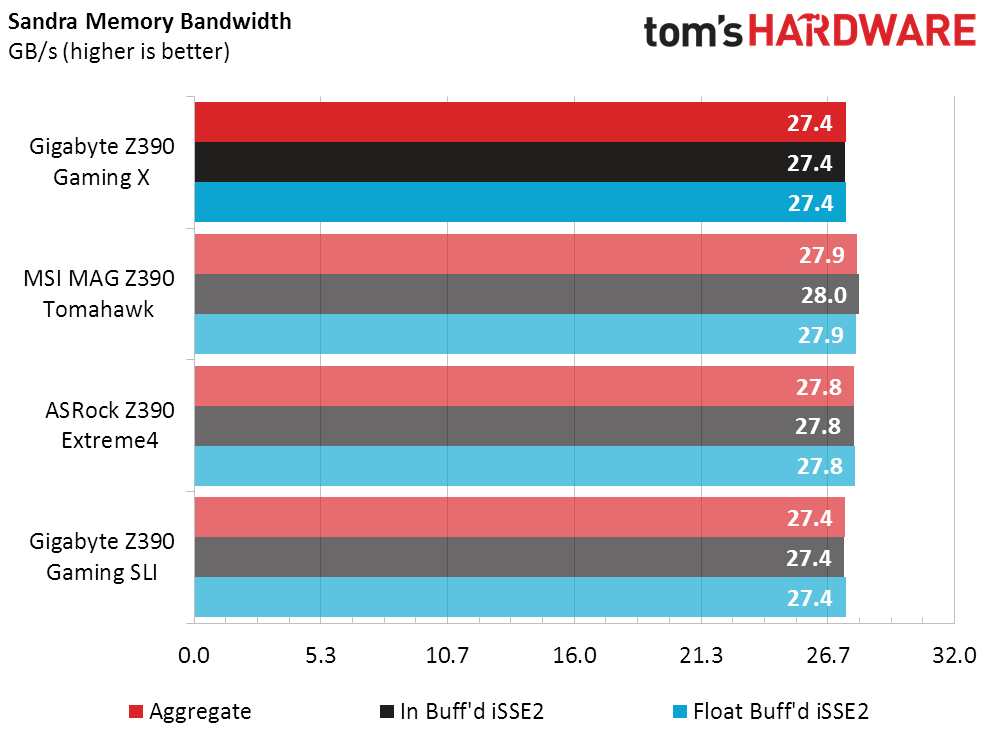
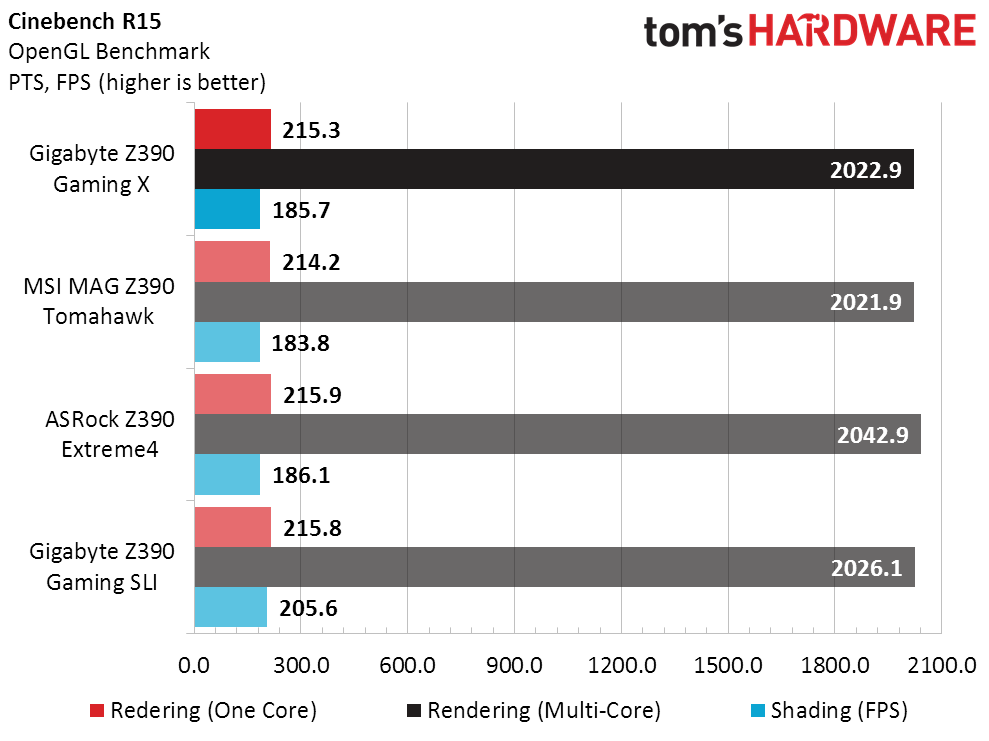
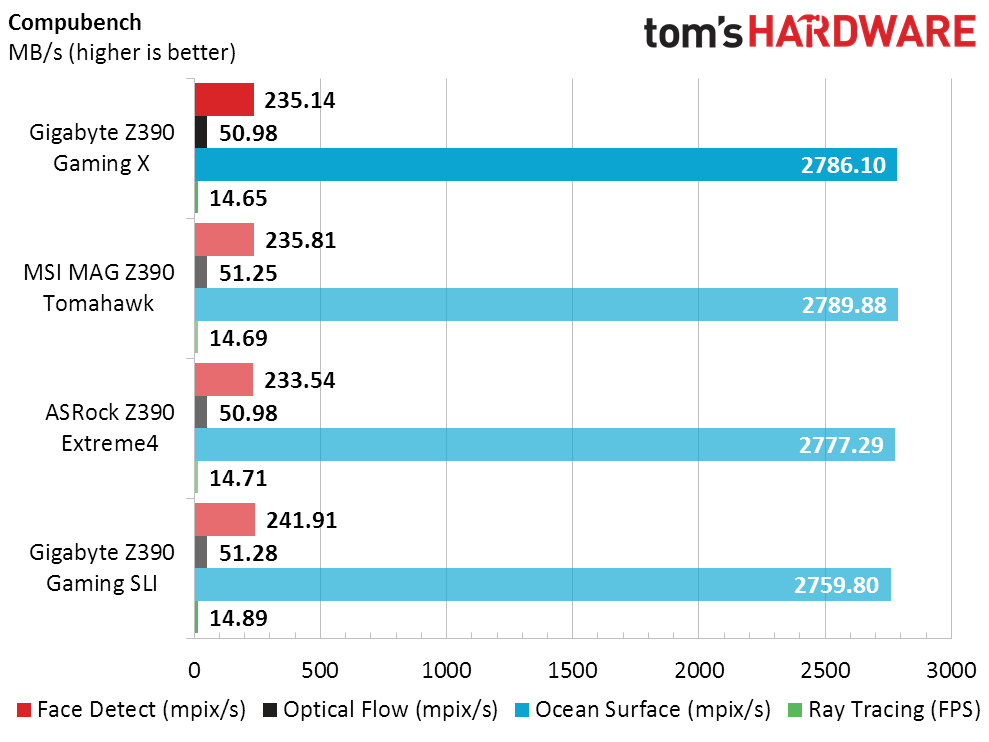
ASRock’s sample had the greatest deviation from average performance in 3DMark Firestrike and PCMark, but that’s because it was first to throttle our Core i9-9900K when heavily loaded. Both Gigabyte boards come up a little short in Sandra’s Memory Bandwidth test, when compared to ASRock and MSI samples.
3D Games
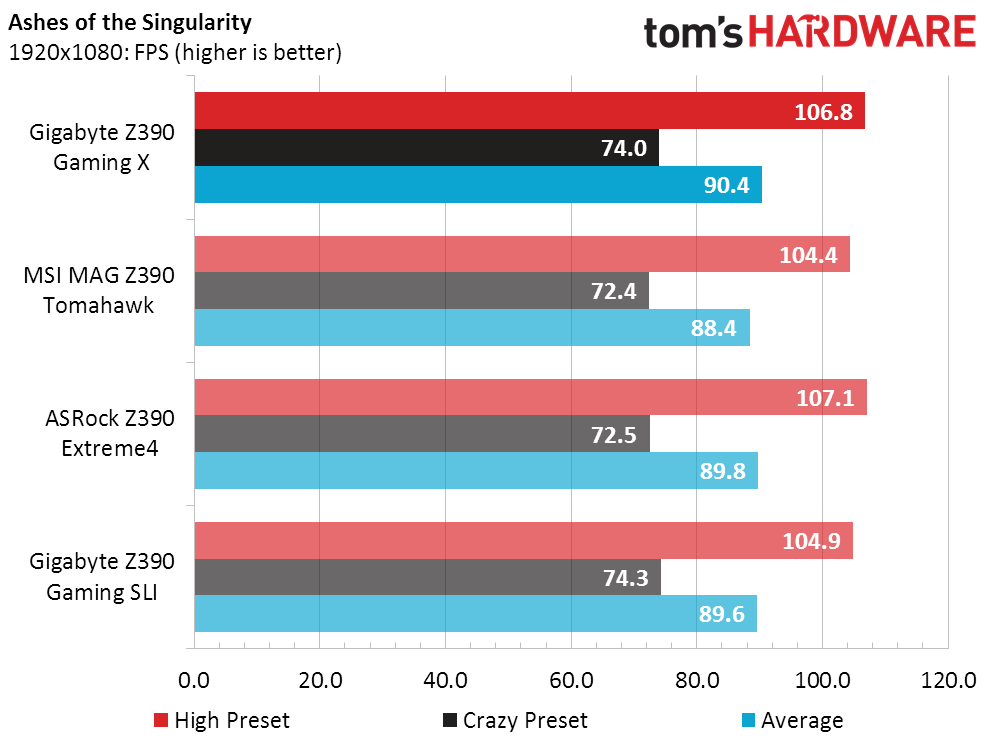
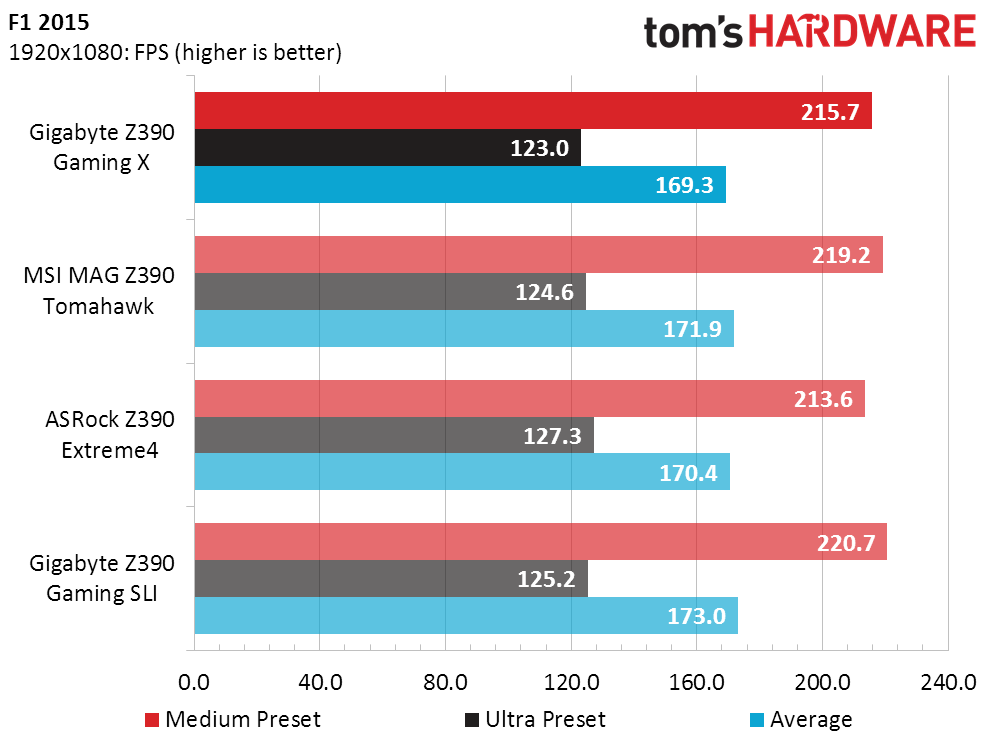
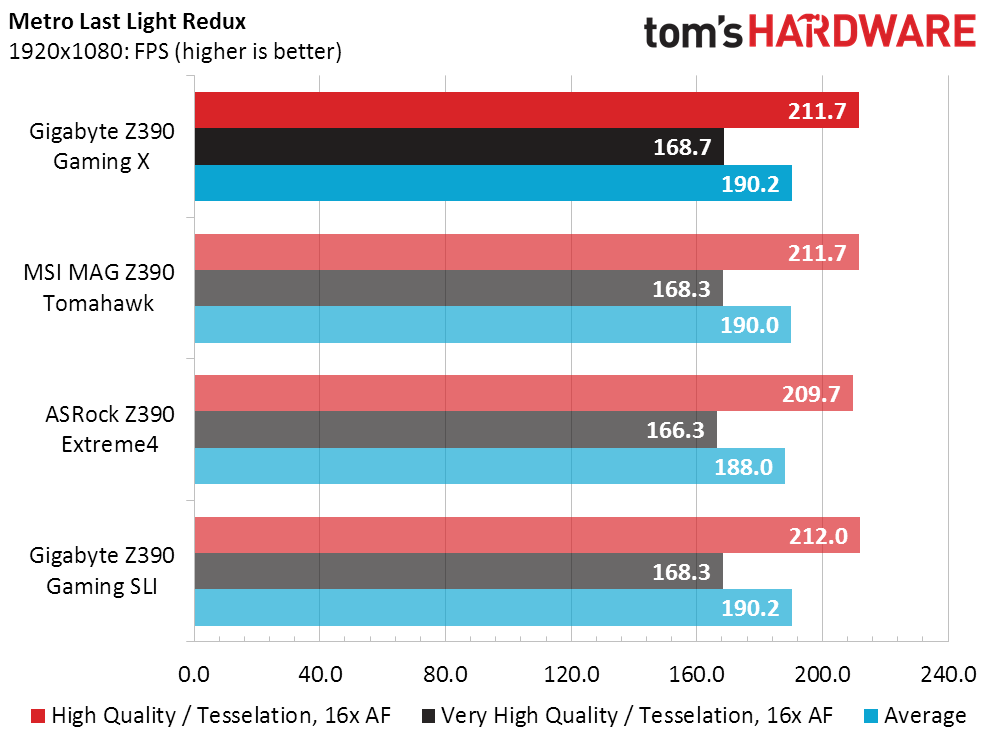
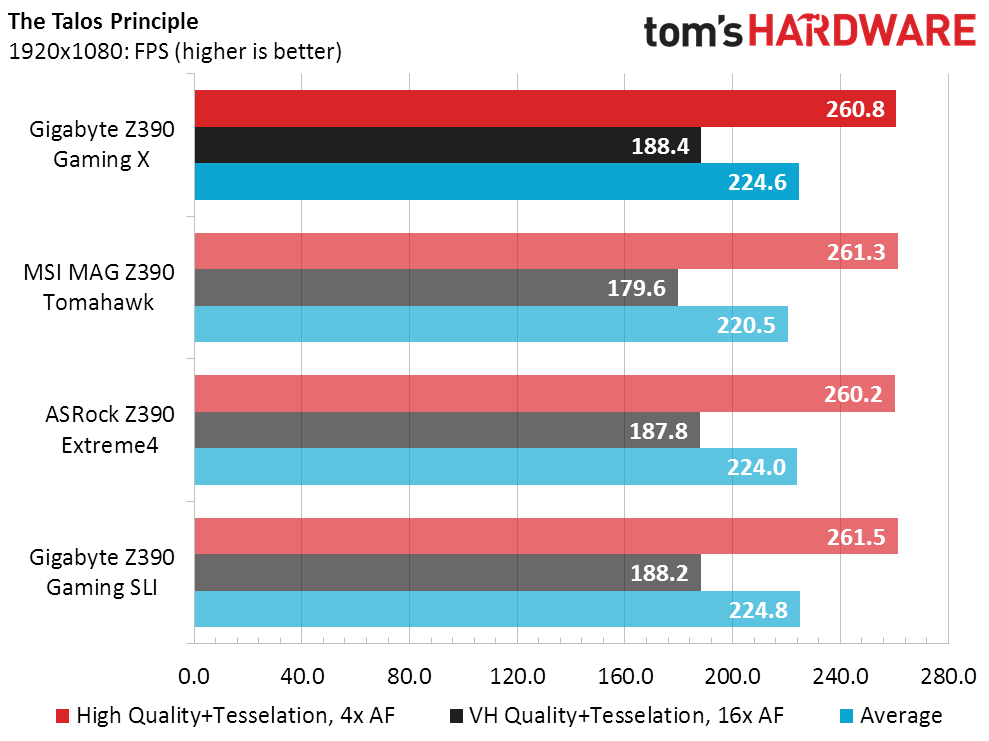
The Z390 Gaming X came up a couple FPS below average in F1 2015, but that’s hardly an issue when average FPS is this high. Its overall average gaming performance is 0.7% above that of all previously-tested boards, compared to the Gaming SLI’s 1.1% above average. While that average was pulled down by some boards that aren’t in today’s charts, the ASRock and MSI boards’ averages trail the Gaming X by 0.6 and 0.3 percent, respectively.
Timed Applications
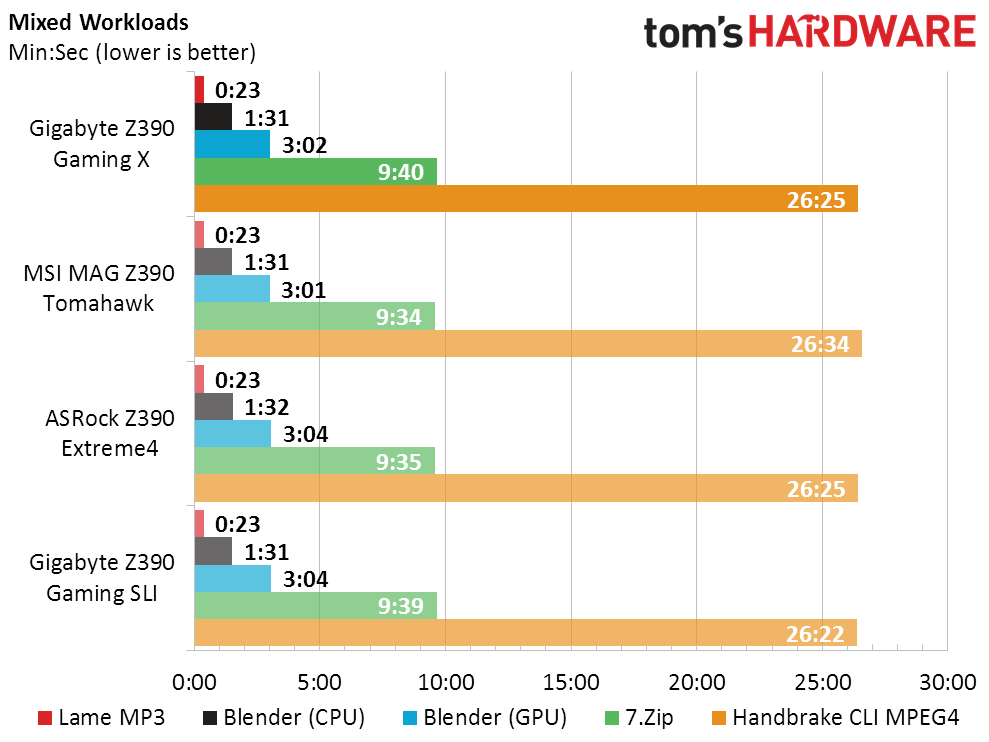
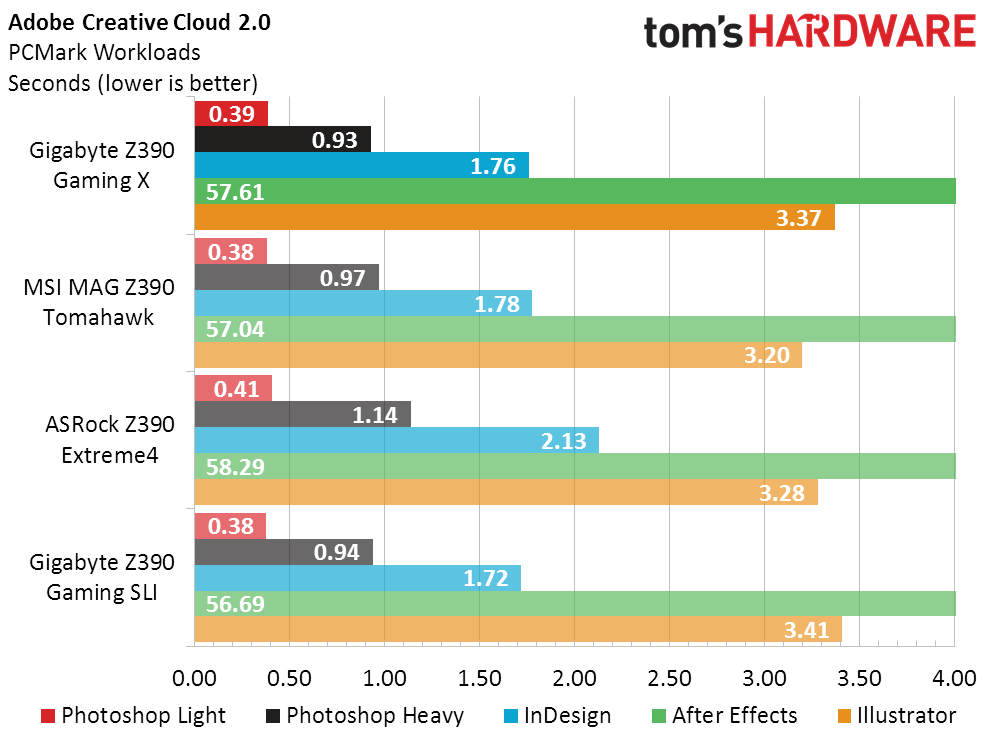
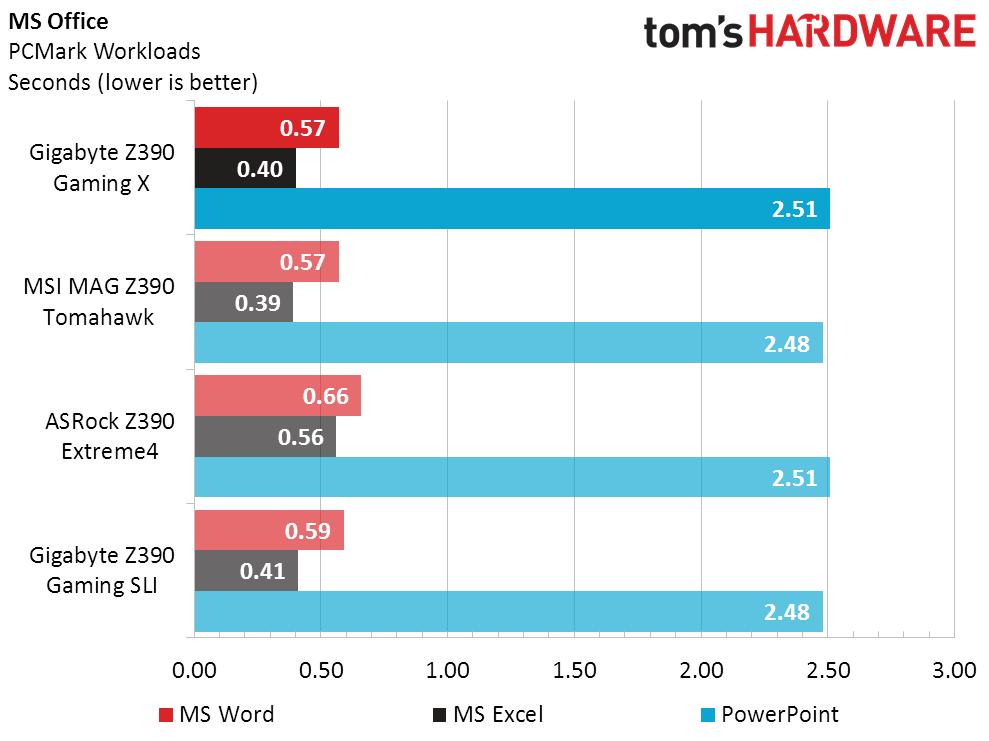
The Z390 Gaming X was slowest to complete our lengthy 7.Zip compression test by a mere second, and quickest to complete PC Mark’s “Photoshop Heavy” workload by a tenth of a second. That tenth is slightly more significant in a test this short.
Power, Heat And Efficiency
Even though it has a slightly reduced feature set compared to the Z390 Gaming SLI, the Z390 Gaming X consumed slightly more power under load. This might have been due to other factors since the Gaming X used less energy at idle compared to its sibling. The two Gigabyte boards finish with the same average power score, undercutting MSI and ASRock.
Both the MAG Z390 Tomahawk and Z390 Extreme4 required an extra fan over the voltage regulator simply to run Prime95 small-FFTs at stock CPU settings, and that change in test method invalidated any voltage regulator thermal readings. The Z390 Gaming X’s highest thermal reading came from its monitoring software, and we had to lower our ambient temperature to 16° just to make it run long enough to get its highest reading. We tried even lower temperatures for the MSI and ASRock boards, but still needed to add a fan.
Performance and power percentages are based on all eighteen tested Z390 motherboards, including some heavily-loaded high-end models and a few Mini ITX boards. The Z390 Extreme4’s excessive power consumption hits it even harder than its below-average performance in our efficiency score, and the Gaming X takes second place to the Gaming SLI.
Get Tom's Hardware's best news and in-depth reviews, straight to your inbox.
Overclocking
The Z390 Gaming X pushed our Core i9-9900K to the same 4.90 GHz a the Z390 Gaming SLI, and even reached the same DRAM overclocks. The MAG Z390 Tomahawk required a voltage reduction simply to run our CPU at its stock 4.70 GHz all-core-boost ratio, as stock settings caused it to throttle back after a few minutes. The Z390 Extreme4 couldn’t even run our CPU at its specified 4.70 GHz, no matter what settings we tried.
Four ranks outperform two on Intel’s platforms, so that four single-rank DIMMs also outperform too. ASRock’s tiny lead in DRAM overclocking helps it hit the highest bandwidth with four ranks installed, despite the frequency advantage available after dropping to two modules. The Z390 Gaming X takes second place, followed by the Z390 Gaming SLI.
Final Thoughts
Even though it appears similar to the Z390 Gaming SLI, the Z390 Gaming X also appears to have far lower manufacturing cost. It’s not just that Gigabyte subbed a pair of USB 2.0 ports where the more-expensive board had USB3, and it’s not just that the firm left out the group of PCIe switches that made x8/x8 mode possible on the pricier version either. The Z390 Gaming X ran hotter, so hot that we wouldn’t recommend anyone run Prime95 small FFTs on a bone-stock Core i9-9900K using nothing more than the fans of a front-mounted radiator to cool its voltage regulator. Not that an average user would, but testing in that manner proved that the Z390 Gaming X really needs a fan to be very close to its CPU socket just to keep the voltage regulator from throttling back the CPU under heavy loads.
Given that our testing is an extreme example for a sub-$150 board, most buyers in the budget-overclocking segment will be thrilled by its low price. It did, after all, push our Core i9-9900K to the same 4.90 GHz as some of the best boards we’ve tested -- but that was only after we added a fan over the voltage regulator.
Yet even at its lower price, the Z390 Gaming X isn’t the bargain that the Z390 Gaming SLI once was -- back when Gigabyte was distributing that board in USA. But, the Z390 Gaming X is cheaper, not all buyers want x8/x8 capability, and most budget-minded overclockers would probably be willing to sacrifice a couple USB 3.1 ports to save money.
And so the Z390 Gaming X becomes our latest pick as the best cheap Z390 board, not because it’s as good as our previous choice, but simply because it’s still available, and it’s even cheaper than our previous choice.
Image Credits: Tom's Hardware
MORE: Best Motherboards
MORE: How To Choose A Motherboard
MORE: All Motherboard Content
-
LordVile Don't really see the "budget" aspect of a board that you have to pay 400 for a CPU for anyway. Because if you're not running a 9900K what do you need Z390 for?Reply -
icouldcareless why review a year old Gigabyte Z390 Gaming X when the Gigabyte X570 Gaming X just came out? according to newegg the gaming x is the 2nd best seller for X570 but you wont find any reviews for it.Reply -
Crashman Reply
9600K. Testing with the heavy power load of the 9900K is just overkill enough to assure you that you can do anything you wish with the 9600k. And what else would you use with any current, unlocked Intel 1151 processor?LordVile said:Don't really see the "budget" aspect of a board that you have to pay 400 for a CPU for anyway. Because if you're not running a 9900K what do you need Z390 for?
Not a year old in review options, it wasn't available to us until November. We procured this in May as an alternative to the Gaming SLI, which was cut from US distribution shortly after being awarded. It was supposed to have been a June review but X570 coverage started before I got around to writing this review's conclusion.icouldcareless said:why review a year old Gigabyte Z390 Gaming X when the Gigabyte X570 Gaming X just came out? according to newegg the gaming x is the 2nd best seller for X570 but you wont find any reviews for it. -
LordVile Reply
Or you could just get a Z370 board? Also why would ANYONE buy the 9600k? It's a 6c Chip with no HT. You can get a 6c/12t R5 for just over half the price with a b450 board that goes for under 100. Or you could get a 3600 with for less than the 9600K with a board for the same price for the set and have features like PCIE 4. Literally the only reason to buy an intel platform now is the Adobe suite to use the iGPU for rendering and 240Hz gaming because in everything else AMD has either caught or exceeded intel at a lower price.Crashman said:9600K. Testing with the heavy power load of the 9900K is just overkill enough to assure you that you can do anything you wish with the 9600k. And what else would you use with any current, unlocked Intel 1151 processor?
Not a year old in review options, it wasn't available to us until November. We procured this in May as an alternative to the Gaming SLI, which was cut from US distribution shortly after being awarded. It was supposed to have been a June review but X570 coverage started before I got around to writing this review's conclusion. -
Crashman Reply
What's still available for Z370? The Z390 is basically Z370 with integrated USB3 Gen2. And I don't know why anyone would bring AMD processors into a Z390 motherboard discussion.LordVile said:Or you could just get a Z370 board? Also why would ANYONE buy the 9600k? It's a 6c Chip with no HT. You can get a 6c/12t R5 for just over half the price with a b450 board that goes for under 100. Or you could get a 3600 with for less than the 9600K with a board for the same price for the set and have features like PCIE 4. Literally the only reason to buy an intel platform now is the Adobe suite to use the iGPU for rendering and 240Hz gaming because in everything else AMD has either caught or exceeded intel at a lower price. -
LordVile Reply
Z370 boards are also cheaper and not advised for the higher end chips like the 9900K.Crashman said:What's still available for Z370? The Z390 is basically Z370 with integrated USB3 Gen2. And I don't know why anyone would bring AMD processors into a Z390 motherboard discussion.
Because the only thing you can put into a Z390 board is a 8th or 9th gen intel CPU. For the board reviewed, it's decent. It's not great, you could get a lot more for not much more investment. AMD is brought up because very few people should actually buy intel chips at the current time. For most tasks the much cheaper R5 2600 and a B450 board would do fine and for not much more you can get an X570 board and a ryzen 3000 series chip which for a start the 3700x is over £100 cheaper than the 9900K, the R9 3900X which demolishes the 9900K in productivity is the same price once you factor in the cooler you have to buy for the 9900K and all down the stack AMD is the cheaper and better option. The 3600 6c/12t for 200 vs the 6 core 6 threaded 9600K at 220 again without a cooler. The 9700k is 365 for 8 cores where the 3700x has 8 with SMT for 320 but includes a cooler. Intel chips are too expensive for what they are, they offer no HT against AMD chip that do, AMD has caught up on IPC even though speed is still capped about 0.5Ghz slower, they are more energy efficent and have implemented new tech like PCIE 4 that Z390 boards don't have.
Doesn't matter how "good" the board is if the platforms position is untenable to everyone who doesn't need quick rendering times on adobe premiere. -
cryoburner Reply
It's clearly relevant to look at all available products, not just one particular ecosystem, especially when "budget" is brought up. It's a bit of a stretch to consider a 9600K, Z390 motherboard and a capable cooler as a good "budget" offering.Crashman said:And I don't know why anyone would bring AMD processors into a Z390 motherboard discussion.
Some may be primarily interested in lightly-threaded performance for the specific software they run. But while a 6-core, 6-thread 9600K might currently run the vast majority of games and applications rather well, it's probably not going to hold up as well over time. And if that leaked roadmap for Intel's 10th-gen processors is to be believed, and they enable hyperthreading across their lineup to match AMD on thread count for their next CPUs, the 9600K may only be i3-level performance by around the end of the year, and the new i5s may perform more like the current i7s. The pricing just doesn't make much sense now. Once you figure in the cost of a capable cooler, it's priced within reach of an 8-core, 16-thread Ryzen 3700X, which in terms of multithreaded performance is most comparable to an i9-9900K, let alone the much lower-priced 6-core, 12-thread 3600.LordVile said:Also why would ANYONE buy the 9600k?
As far as gaming performance is concerned, with most common graphics card / resolution pairings, the slightly better per-thread performance of a 9600K is arguably not worth giving up SMT for, especially when you are paying a premium for it. For most gaming systems, the added cost of a 9600K over a 3600 would likely be better put toward graphics hardware. -
LordVile Replycryoburner said:It's clearly relevant to look at all available products, not just one particular ecosystem, especially when "budget" is brought up. It's a bit of a stretch to consider a 9600K, Z390 motherboard and a capable cooler as a good "budget" offering.
Some may be primarily interested in lightly-threaded performance for the specific software they run. But while a 6-core, 6-thread 9600K might currently run the vast majority of games and applications rather well, it's probably not going to hold up as well over time. And if that leaked roadmap for Intel's 10th-gen processors is to be believed, and they enable hyperthreading across their lineup to match AMD on thread count for their next CPUs, the 9600K may only be i3-level performance by around the end of the year, and the new i5s may perform more like the current i7s. The pricing just doesn't make much sense now. Once you figure in the cost of a capable cooler, it's priced within reach of an 8-core, 16-thread Ryzen 3700X, which in terms of multithreaded performance is most comparable to an i9-9900K, let alone the much lower-priced 6-core, 12-thread 3600.
As far as gaming performance is concerned, with most common graphics card / resolution pairings, the slightly better per-thread performance of a 9600K is arguably not worth giving up SMT for, especially when you are paying a premium for it. For most gaming systems, the added cost of a 9600K over a 3600 would likely be better put toward graphics hardware.
Wouldn't really believe Intels roadmaps at this point anyway. 10nm was supposed to be due at 8th gen which was what 2018? Doubt they put HT on the i5's though cos then they'd need HT on the i7 which means they'd have to bump the core count on the i9 and then they'd have thermal issues when trying to hit 5Ghz which is their only selling point right now. Unless they get 10nm out I don't see what intel could do to compete with AMD other than dropping prices which they seem reluctant to do. They have inferior products throughout the stack for higher prices (for the majority of applications) and people seem to just be buying them cos of intel inside or just pure fanboyism/lack of common sense because the 9900K might net you however much more FPS over a 3700X with a 2080Ti but the vast majority of people do not have a grands worth of GPU and with a say 2070 you might be within margin of for the 2080Tin is 200FPS over 180 FPS really worth the extra 100+ in cost? I mean that's another TB of SSD storage there, a good mech keyboard or headphones -
Crashman Reply
Sorry, that's a generalization that has nothing to do with this topic.cryoburner said:It's clearly relevant to look at all available products, not just one particular ecosystem, especially when "budget" is brought up. It's a bit of a stretch to consider a 9600K, Z390 motherboard and a capable cooler as a good "budget" offering -
CletusAwreetus First timer here. Just need a little clarification.Reply
"the Z390 Gaming X really needs a fan to be very close to its CPU socket just to keep the voltage regulator from throttling back the CPU under heavy loads."
Don't exactly know what this means for my build.
I plan on using my PC solely for Audio production. I will likely NOT be overclocking the cpu.
My setup will consist of an:
i5-9600k (using integrated graphics rather than dedicated GPU)
Hyper Evo 212 cpu cooler
Meshify C case with the stock front and rear 120mm fans + an additional 120mm fan in front.
Would this setup provide enough air flow to prevent cpu throttling?
As a side note:
I will be using a WD Blue 500gb NVMe ssd boot drive.
Should I install this in the top M.2 connector, with the heat spreader, or the bottom location?
Also I have already purchased a Seasonic Focus Gold 550w PSU, which does not have the extra
4-pin, 12v connector for the cpu. I believe I won't need the extra power if I am not running a GPU card or overclocking the cpu. Am I right in making this assumption? Or, do I need a PSU with the
8 pin and 4 pin power connectors to power the cpu?
Any advice would be greatly appreciated. I don't really know what I'm doing.
